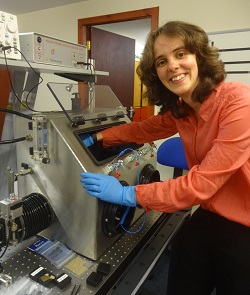St Andrews researcher hopes to make her mark
 A young researcher at the University of St Andrews has been given a boost in her bid to make a mark in the world of criminal investigations.
A young researcher at the University of St Andrews has been given a boost in her bid to make a mark in the world of criminal investigations.
Physics PhD student Susanna Challinger has been awarded an Industrial Fellowship by The Royal Commission of the Exhibition of 1851 to help bring novel fingerprint detection technology to life. Susanna is one of just ten young researchers in the UK to be granted the three year funding package of £80,000.
The Industrial Fellowships – which celebrate and advance British technologies – help recent graduates develop “innovative technology with commercial potential”, ideally leading to a patent.
The Fellowship stipulates that all work must be carried out alongside an academic institution and a business partner. Susanna will work with her supervisors – Professors Graham Turnbull and Ifor Samuel from the Organic Semiconductor Optoelectronics Research Group at the University’s School of Physics & Astronomy – and Professor Iain Baikie, CEO of KP Technology, a small high-tech company based in Wick.
Susanna (24), from Buckinghamshire, commented: “I am delighted and honoured to be awarded an 1851 Industrial Fellowship as an employee of KP Technology and PhD student at the University of St Andrews. I am very much looking forward to the exciting and challenging time ahead.”
The original mission of the Royal Commission set out to “increase the means of industrial education and extend the influence of science and art upon productive industry”. Susanna’s research uses a combination of a Kelvin probe detector and two tuneable light beams. With the funding, Susanna aims to advance the instrumentation and techniques used in detecting the electrical characteristics of materials, and extend the application of the micro-tip Scanning Kelvin probe in forensics.
Susanna explained: “The equipment will be applied to measure and investigate the energy levels of materials. This information can be applied to ‘engineer’ the electrical properties of thin nano-materials with the aim of improving the efficiency of novel solar cell technology.
“The project also builds upon KP Technology’s considerable research experience in high resolution work function imaging which includes the recovery of latent fingerprints from metallic surfaces. I will examine the effects of heating, to simulate the impact of firing, on the recovery of nano-scale fingerprint traces from metals and fired cartridges. If successful, this development could represent a major breakthrough in criminal investigations.”
Notes to news editors
Issued by the University of St Andrews Communications Office, contactable on 01334 462530 or [email protected].
Category Research